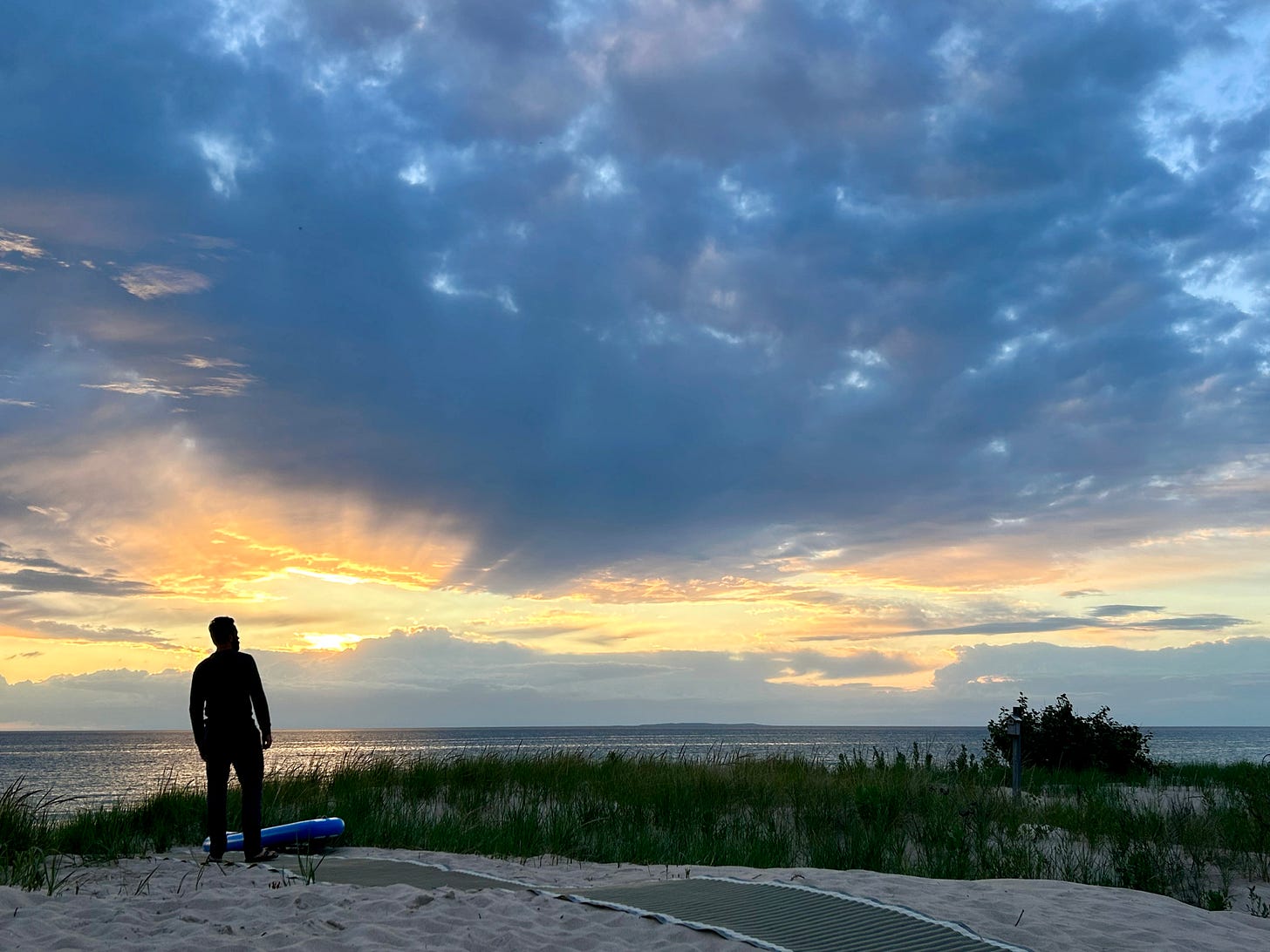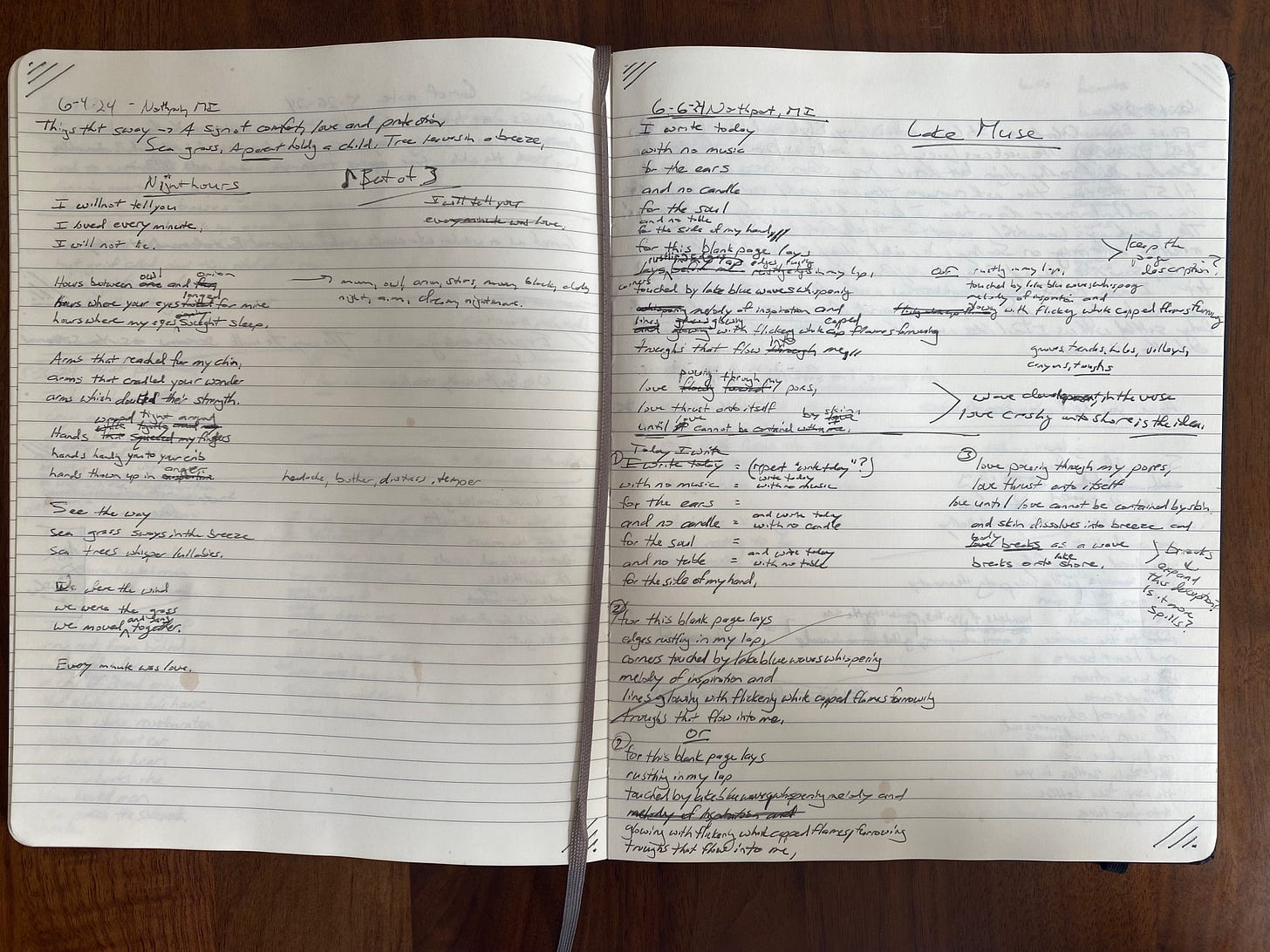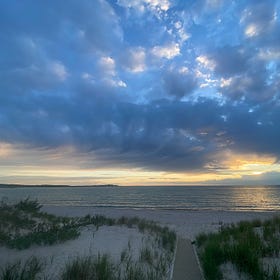Lake muse: A reflection
Inspiration's source
Lake muse is a poem that begins by exploring simple habits and their resulting inspiration, then moves to considering the complexity of the Muse.
Habits and Inspiration
Habits run deep. During a typical week at home, I have a flow of habits that add an element of predictability to the day so that I do the things I need to do and want to do without the mental effort of everyday, ordinary decisions. I know what time I will wake up, and that I will start heating the water in the electric kettle, then meditate while the water warms, and brew French roast or Kaldi’s 700 blend (Saint Louis coffee roaster, so good) while listening to a short poetry podcast (Poetry Unbound or The Slowdown), then write for 30 to 45 minutes. Next, it is about preparing for the day…feed the dog and go for a walk, shower, dress, followed by career work, exercise…you get the picture. Forming and maintaining habits that serve us contributes to our growth.
Then there are the specific habits I use to create a place for inspiration. I write at my dining room table in the early morning before any other soul is stirring, except the dog who often is on nap number two of the day resting by my chair. I have a carafe of coffee and my speckled white and black mug sitting just to the right of my Moleskin notebook and Pilot Frixion erasable pen. I leave the overhead light off and turn on one of the two lamps for just enough light to write by as dawn begins, aided by a candle in the months where it is still dark outside and dawn may be an hour or more away. Even in the warm months, I will have a blanket covering my lap. Ambient music, most often This Will Destroy You or Foam and Sand or some Spotify radio station based on one of the two, plays through my AirPods. It is all one big habit, curated and tweaked over time as I have learned what inspires my artistic process.
The day I wrote Lake Muse, I was far from these habits in a small beach-side vacation house, sitting in a sunroom that was nestled into a dune with a view of Lake Michigan. It was mid-morning, quiet, and the windows were open with a chilly breeze blowing through the house. I could hear the waves, the wind, and the birds. I didn’t have a writing table and instead of bowing over a coffee table, decided to nestle back into the chair and write in my lap.
The poem begins with a simple statement of what was absent that morning from my typical creative habits, but then moves into how this natural setting recreated my typical writing environment without any effort from me. My lap became the black walnut table. The wind rustling my paper was the ambient music. The whitecapped waves were the lit candle. And all this non-effort produced a creative session of flow by opening pathways for the Muse to pour into me.
The Muse
Now, what about this idea of the Muse? Pondering inspiration gives us a glimpse of what the Muse provides, but not what the Muse is. The Miriam-Webster definition of Muse tells us she is something we will never truly figure out.
Noun
1. capitalized: any of the nine sister goddesses in Greek mythology presiding over song and poetry and the arts and sciences
2. : a source of inspiration, a guiding genius
While none of the nine sister goddesses have ever stopped by and knocked on my door, this part of the definition shows that we are trying to define something that likely cannot be defined, something mysterious and mythical. Even the word source is a word often used in spiritual collectives as a way to describe a god in a broad context, something that we cannot put our finger on directly. A clean understanding is not the point. Experiencing the numerous, multi-faceted qualities of the Muse is what is on offer, and for those who engage with her, they will begin to know her without definition.
As I have thought about what these qualities could be, the biblical idea of the fruits of the spirit seems to make sense. Love, Joy, Peace, Patience, Kindness, Goodness, Faithfulness, Gentleness, and Self-control. Buddhism is famous for their lists, many that seem to make sense in this context as well, such as the seven factors of awakening, which are Mindfulness, Investigation, Energy, Rapture, Tranquility, Concentration, and Equanimity. Perhaps the world’s ancient teachings are an instruction on how to know the Muse and follow a path to live an inspired life.
I also see the Muse present the quality of beauty. It is not beauty in the conventional standards of symmetry, color theory, or shape, but something much more complex. The beautiful trait of the muse seems to be the summation of all of her other qualities. Again, she is and will always be a mystery.
For all the qualities that the Muse offers, Lake Muse was inspired by love. Two images came together for this illustration. The first is a wave cycle, the flow of water pushed by wind that builds onto itself while moving quickly until the wave cannot be held up and breaks, over and over again. The other is the experience of the dissolution of the self that can happen in states of flow or meditation. In culmination, the final stanza speaks of a transformation that can occur as the Muse pours love into one’s being and a person gives themself over to the Muse.
In closing
Stepping out of our habits for short periods of time is an interesting way to invite the Muse. While not an equation, traveling to a natural environment that is not in our everyday surroundings seems to sharpen our attention to the world and the happenings around us, which often turns the tables back on us by speaking to our own inner state, sparking what I describe as inspiration. Consider how often you have examined the state of your life when on a beach, hiking through the woods or exploring the mountains. There is something about the unusual-to-us that changes how we view ourselves and our relationship to this world that we are of and spurs us to action.
However, instead of continuously striving for a change or an escape to the unusual, perhaps the posture needed for a good life is an openness to the Muse wherever we find ourselves. Walk through your typical day, tend your habits and handle the disruptions, engage in work and play, embrace the fun and the struggle and keep eyes open to the possibility that the Muse could arrive at any time with any of her traits and leave you inspired. She passes all around and openness to her presence makes it all the more likely we will catch a glimpse of her. Then, our task is to simply respond to the inspiration with our individual process, and when this response is nurtured, the outcomes we chase can take a back seat to simply acting in the midst of inspiration.
Finally, here is the full definition of Muse. Note the end of number one and number three.
Noun
1. capitalized: any of the nine sister goddesses in Greek mythology presiding over song and poetry and the arts and sciences
2. : a source of inspiration, a guiding genius
3. : Poet
Perhaps, just perhaps, the Muse is within each of us.
May love pour through your pores…
Brian
If you missed the original “A Poem” post of Lake muse, I hope you will read and enjoy! You can find it here.
Lake muse
for this blank page lays
rustling in my lap
touched by lake blue
waves whispering melody
glowing with flickering white capped flames
furrowing troughs that flow into me...





I loved this piece, Brian. It's hypnotic to listen to you describe your daily routine. I wish I had that kind of discipline. I'm more like a neurotic hummingbird flitting from one task to another as one bloom seduces me more than the last, or on the flip side, something threatens to boil over if left unattended.
Your openness has made a home that welcomes the Muse’s song every morning. I feel like you’re mindfully creating conditions to thrive. At the same time, it seems like you’ve kept things simple and playful—full of good humor—the word “fun” leaps out at me :) Your habits keep you always topped-off, always ready to engage the Muse *whenever* she visits. Or *wherever* like up at the lake, when your devotion to your morning ritual brought the joy of this poem to life! Sometimes the right conditions can awaken us in a new way, and then you just let love guide your hand across the page. Really now—what’s better than that?